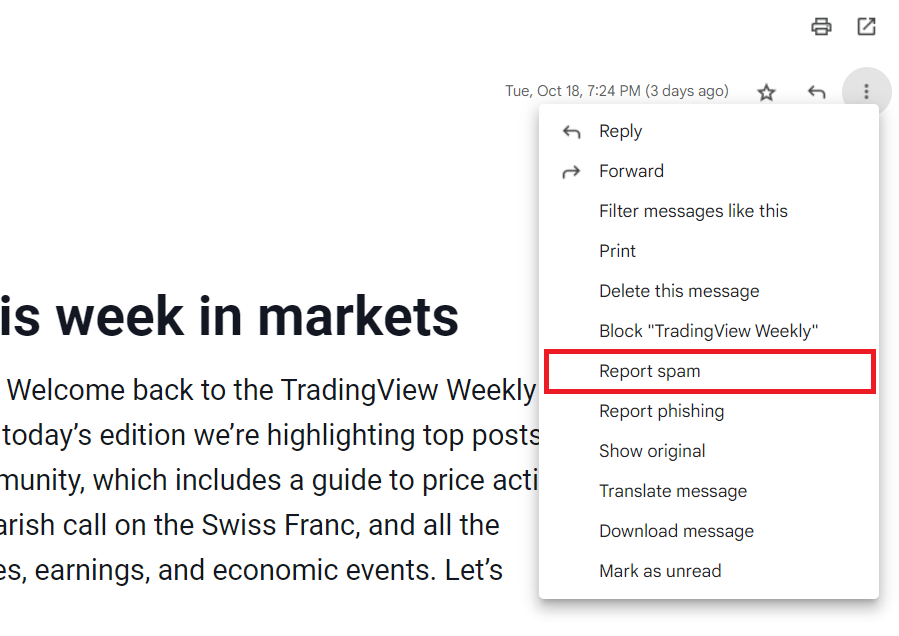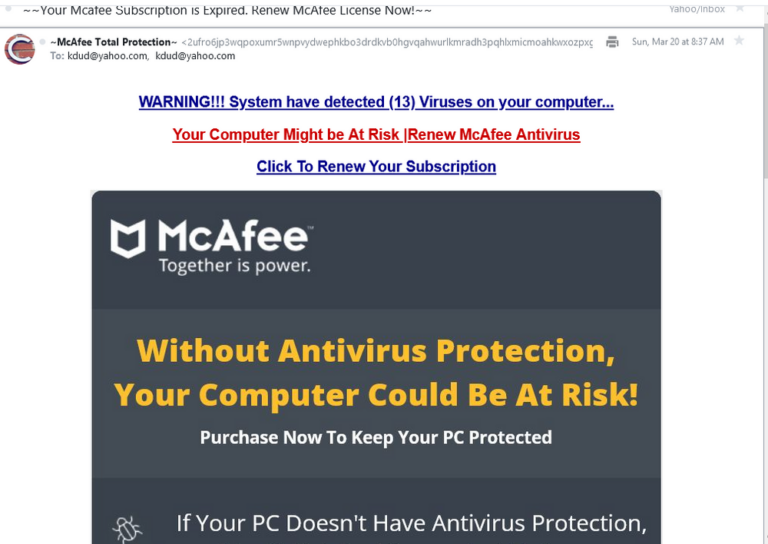McAfee fraud emails have become a growing concern for internet users worldwide. These phishing attempts aim to deceive individuals into sharing sensitive information or making unauthorized payments. Understanding the characteristics of these fraudulent emails is crucial in safeguarding your personal data and finances. In this article, we will explore the tactics used by cybercriminals and provide actionable tips to protect yourself from becoming a victim.
As technology advances, so do the methods used by cybercriminals to exploit unsuspecting individuals. McAfee, a well-known name in cybersecurity, has unfortunately become a target for scammers seeking to capitalize on its reputation. By impersonating McAfee's official communication, fraudsters send deceptive emails that can easily trick users into divulging confidential information.
This comprehensive guide will delve into the world of McAfee fraud emails, equipping you with the knowledge and tools needed to identify and combat these threats effectively. Stay informed, stay vigilant, and protect yourself from the growing menace of phishing scams.
Read also:Famous People With Turner Syndrome Celebrating Strength And Resilience
Table of Contents
- Introduction to McAfee Fraud Emails
- Characteristics of McAfee Fraud Emails
- McAfee: A Brief Overview
- Common Tactics Used in McAfee Fraud Emails
- How to Identify McAfee Fraud Emails
- Prevention Tips for Avoiding McAfee Scams
- What to Do If You Receive a Fraudulent Email
- Legal Actions Against McAfee Fraud
- Useful Resources for Staying Safe Online
- Conclusion and Call to Action
Introduction to McAfee Fraud Emails
McAfee fraud emails are a specific type of phishing scam designed to mimic official communication from McAfee. These emails often claim that there is an issue with your subscription, account, or software, prompting you to take immediate action. The primary goal of these scams is to trick users into providing sensitive information such as passwords, credit card details, or social security numbers.
Why McAfee?
Cybercriminals target reputable brands like McAfee because they know users trust these companies. By leveraging McAfee's name, scammers increase the likelihood of tricking individuals into believing the email is legitimate. This tactic exploits the trust users place in well-known cybersecurity firms.
Global Impact
McAfee fraud emails are not limited to a specific region; they affect users worldwide. According to a report by the Federal Trade Commission (FTC), phishing scams, including those impersonating McAfee, have resulted in millions of dollars in losses annually. The widespread nature of these scams underscores the importance of awareness and vigilance.
Characteristics of McAfee Fraud Emails
Understanding the characteristics of McAfee fraud emails is essential in identifying and avoiding these scams. Below are some common features to watch out for:
Urgent Language
Fraudulent emails often use urgent language to create a sense of panic. Phrases like "Your account will be suspended," "Immediate action required," or "Unpaid subscription" are typical examples. This urgency is designed to pressure recipients into acting without thoroughly verifying the email's authenticity.
Unofficial Email Addresses
Legitimate McAfee emails will always come from official domains such as "@mcafee.com." Fraudulent emails, however, may use variations like "@mcafee-support.com" or "@mcafee-security.net." Always double-check the sender's email address before responding.
Read also:Maelle Eto Rising Star In The World Of Football
Request for Sensitive Information
Official McAfee emails will never ask for sensitive information such as passwords, credit card numbers, or personal identification details. If an email requests this information, it is almost certainly a scam.
McAfee: A Brief Overview
McAfee is a globally recognized name in the cybersecurity industry. Founded in 1987 by John McAfee, the company specializes in developing antivirus software, firewalls, and other security solutions. McAfee's products are designed to protect users from a wide range of online threats, including viruses, malware, and phishing attacks.
| Founder | John McAfee |
|---|---|
| Year Founded | 1987 |
| Headquarters | Santa Clara, California, USA |
| Products | Antivirus software, firewalls, encryption tools |
Common Tactics Used in McAfee Fraud Emails
Cybercriminals employ various tactics to make their fraudulent emails appear legitimate. Below are some of the most common strategies used in McAfee fraud emails:
Spoofing Official Logos
Scammers often include McAfee's official logo in their emails to enhance credibility. However, a closer inspection may reveal slight discrepancies in the logo's design or quality.
Counterfeit Links
Fraudulent emails frequently contain links that appear legitimate but redirect to phishing websites. Always hover over links (without clicking) to preview the URL and ensure it matches McAfee's official domain.
Impersonating Support Teams
Some scammers pose as McAfee support agents, offering assistance with supposed issues. They may request remote access to your device or payment for non-existent services.
How to Identify McAfee Fraud Emails
Identifying McAfee fraud emails requires a keen eye for detail. Here are some steps you can take to verify the authenticity of an email:
Check the Sender's Email Address
- Ensure the email originates from an official McAfee domain (@mcafee.com).
- Be wary of email addresses with slight variations or misspellings.
Examine the Email Content
- Look for grammatical errors, poor formatting, or inconsistent branding.
- Verify whether the email contains any requests for sensitive information.
Verify Links and Attachments
- Hover over links to check their destination before clicking.
- Avoid downloading attachments from unknown or suspicious sources.
Prevention Tips for Avoiding McAfee Scams
Preventing McAfee fraud emails involves adopting a proactive approach to online security. Follow these tips to minimize your risk:
Enable Two-Factor Authentication
Two-factor authentication adds an extra layer of security to your accounts, making it harder for scammers to access your information.
Use Reputable Antivirus Software
Installing a trusted antivirus program can help detect and block phishing attempts before they reach your inbox.
Educate Yourself on Phishing Tactics
Stay informed about the latest phishing trends and tactics used by cybercriminals. Knowledge is your best defense against these scams.
What to Do If You Receive a Fraudulent Email
If you receive a McAfee fraud email, it's important to act responsibly to protect yourself and others. Follow these steps:
Do Not Respond
Avoid engaging with the sender or providing any requested information. Responding to fraudulent emails can escalate the situation.
Report the Email
Forward the email to McAfee's official support team or your email provider's abuse department. Reporting scams helps prevent others from falling victim.
Scan Your Device
Run a full system scan using your antivirus software to ensure no malicious software was inadvertently installed.
Legal Actions Against McAfee Fraud
Cybercrime, including McAfee fraud emails, is a serious offense. Authorities worldwide are working to combat these crimes through legislation and international cooperation. If you become a victim of a McAfee scam, consider taking the following legal actions:
Contact Law Enforcement
Report the incident to your local law enforcement agency or cybercrime division. Provide them with all relevant details, including the fraudulent email and any interactions with the scammer.
File a Complaint with Regulatory Bodies
Submit a complaint to organizations such as the FTC or the Internet Crime Complaint Center (IC3) for further investigation and action.
Useful Resources for Staying Safe Online
Staying safe online requires continuous learning and vigilance. Below are some resources to help you enhance your cybersecurity knowledge:
Conclusion and Call to Action
McAfee fraud emails pose a significant threat to internet users, but with the right knowledge and tools, you can protect yourself effectively. By understanding the characteristics of these scams and adopting preventive measures, you can significantly reduce your risk of falling victim. Remember to stay vigilant, report suspicious emails, and educate yourself on the latest cybersecurity trends.
We encourage you to share this article with friends and family to help spread awareness about McAfee fraud emails. For more information on cybersecurity, explore our other articles and resources. Together, we can create a safer online environment for everyone.

